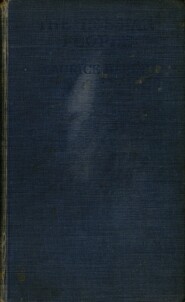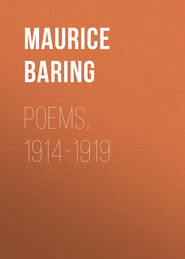По всем вопросам обращайтесь на: info@litportal.ru
(©) 2003-2024.
✖
Overlooked
Настройки чтения
Размер шрифта
Высота строк
Поля
The facts which he related were as far as I knew actually those which had occurred to that group of people during their stay at Haréville two years ago, but the deductions he drew from them, the causes he gave as explaining them, seemed to me at least wide of the mark.
His conception of such of his characters as I knew at all well, and his interpretation of their motives were, in the cases in which I had the power of checking them by my own experience, I considered quite fantastically wrong.
When I had finished reading the book, I sent it to Sabran, and with it the MS. I had written two years ago, and I begged the doctor to read what I had written and to let me know when he had done so, so that we might discuss both the documents and their relation one to the other and to the reality.
(Note. – Here, in the bound copy of Anthony Kay's Papers, follows the story called Overlooked, by James Rudd.)
By JAMES RUDD
1
It was the after-luncheon hour at Saint-Yves-les-Bains. The Pavilion, with its large tepid glass dome and polished brass fountains, where the salutary, and somewhat steely, waters flowed unceasingly, the Pompeian pillared "Galeries" were deserted; so were the trim park with its kiosk, where a scanty orchestra played rag-time in the morning and in the evenings; the florid Casino, which denoted the third of the three styles of architecture that distinguished the appendages of the Hôtel de La Source, where a dignified, shabby, white Louis-Philippe nucleus was still to be detected half-concealed and altogether overwhelmed by the elegant improvements and dainty enlargements of the Second Empire and the over-ripe Art Nouveau excrescences of a later period.
Kathleen Farrel had the park to herself. She was reading the Morning Post, which her aunt, Mrs. Knolles, took in for the literary articles, and which you would find on her table side by side with newspapers and journals of a widely different and sometimes, indeed, of a startling and flamboyant character; for Mrs. Knolles was catholic in her ideas and daring in her tastes.
Kathleen Farrel was reading listlessly without interest. She had lived so much abroad that English news had little attraction for her, and she was no longer young enough to regret missing any of the receptions, race-meetings, garden-parties, and other social events which she was idly skimming the record of. For it was now the height of the London season, but Mrs. Knolles had let the London house in Hill Street. She always let it every summer, and in the winter as well, whenever she could find a tenant.
A paragraph had caught Kathleen's eye and had arrested her attention. It began thus: "The death has occurred at Monks-well Hall of Sir James Stukely."
Sir James Stukely was Lancelot Stukely's uncle. Lancelot would inherit the baronetcy and a comfortable income. He had left the army some years ago. He was at present abroad, performing some kind of secretarial duties to the Governor of Malta. He would give up that job, which was neither lucrative nor interesting, he would come home, and then —
At any rate, he had not altogether forgotten her. His monthly letters proved that. They had been unfailingly regular. Only – well, for the last year they had been undefinably different. Ever since that visit to Cairo. She had heard stories of an attachment, a handsome Italian lady, who looked like a Renaissance picture and who was said to be unscrupulous. But she really knew nothing, and Lancelot had always been so reserved, so reticent; his letters had always been so bald, almost formal, ever since their brief engagement six years before had been broken off. Ever since that memorable night in Ireland when she confessed to her father, who was more than usually violent and had drunk an extra glass of old Madeira, that she had refused to marry Lancelot. At first she had asked him not to write, and he had dutifully accepted the restriction. But later, when her father died, he had written to her and she had answered his letter. Since then he had written once a month without fail from India, where his regiment had been quartered, and then from Malta. But never had there been a single allusion to the past or to the future. The tone of them would be: "Dear Miss Farrel, We are having very good sport." Or "Dear Miss Farrel, We went to the opera last night. It was too classical for me." And they had always ended: "Yours sincerely, Lancelot Stukely."
And yet she could not believe he was really different. Was she different? "Am I perhaps different?" she thought. She dismissed the idea. What had happened to make her different? Nothing. For the last five years, ever since her father had died, she had lived the same life. The winter at her aunt's villa at Bordighera, sometimes a week or two at Florence, the summer at Saint-Yves-les-Bains, where they lived in the hotel, on special terms, as Mrs. Knolles was such a constant client. Never a new note, always the same gang of people round them; the fashionable cosmopolitan world of continental watering-places, the English and foreign colonies of the Riviera and North Italy. She had never met anyone who had roused her interest, and the only persons whose attention she had seemed to attract were, in her Aunt Elsie's words, "frankly impossible."
She would be thirty next year. She already felt infinitely older. "But perhaps," she thought, "he will come back the same as he was before. He will propose and I will accept him this time." Why had she refused him? Their financial situation – her poverty and his own very small income had had nothing to do with it, because Lancelot had said he was willing to wait for years, and everyone knew he had expectations. She could not have left her father, but then her father died a year after she refused Lancelot.
No, the reason had been that she thought she did not love him. She had liked Lancelot, but she hoped for something more and something different. A fairy prince who would wake her to a different life. As soon as he had gone away, and still more when his series of formal letters began, she realized that she had made a mistake, and she had never ceased to repent her action. The fact was, she said to herself, I was too young to make such a decision. I did not know my own mind. If only he had come back when father died. If only he had been a little more insistent. He had accepted everything without a murmur. And yet now she felt certain he had been faithful and was faithful still, whatever anyone might say to the contrary.
"Perhaps I am altered," she thought. "Perhaps he won't even recognize me." And yet she knew she did not believe this. For although her Aunt Elsie used to be seriously anxious about her niece's looks – fearing anaemia, so much so that they sometimes visited dreary places on the sea-coasts of England and France – she knew her looks had not altered sensibly. People still stared at her when she entered a room, for although there was nothing classical nor brilliant about her features and her appearance, hers was a face you could not fail to observe and which it was difficult to forget. It was a face that appealed to artists. They would have liked to try and paint that clear white, delicate skin, and those extraordinarily haunting round eyes which looked violet in some lights and a deep sea-blue in others, and to try and render the romantic childish glamour of her person, that wistful, fairy-tale-like expression. It was extraordinary that with such an appearance she should have been the inspirer of no romance, but so it was. Painters had admired her; one or two adventurers had proposed to her; but with the exception of Lancelot Stukely no one had fallen in love with her. Perhaps she had frightened people. She could not make conversation. She did not care for books. She knew nothing of art, and the people her aunt saw – most of whom were foreigners – talked glibly and sometimes wittily of all these things.
Kathleen had been born for a country life, and she was condemned to live in cities and in watering-places. She was insular; though she had lived a great deal in Ireland, she was not Irish, and she had been cast for a continental part. She was matter-of-fact, and her appearance promised the opposite. She was in a sense the victim of her looks, which were so misleading.
But perhaps the solution, the real solution of the absence of romance, or even of suitors, was to be found in her unconquerable listlessness and apathy. She was, as it were, only half-alive.
Once, when she was a little girl, she had gone to pick flowers in the great dark wood near her home, where the trees had huge fantastic trunks, and gnarled boles, and where in the spring-time the blue-bells stretched beneath them like an unbroken blue sea. After she had been picking blue-bells for nearly an hour, she had felt sleepy. She lay down under the trunk of a tree. A gipsy passed her and asked to tell her fortune. She had waved her away, as she had no sympathy with gipsies. The gipsy had said that she would give her a piece of good advice unasked, and that was, not to go to sleep in the forest on the Eve of St. John, for if she did she would never wake. She paid no attention to this, and she dozed off to sleep and slept for about half-an-hour. She was an obstinate child, and not at all superstitious. When she got home, she asked the housekeeper when was the Eve of St. John. It happened to fall on that very day. She said to herself that this proved what nonsense the gipsies talked, as she had slept, woken up, come back to the house, and had high tea in the schoolroom as usual. She never gave the incident another thought; but the housekeeper, who was superstitious, told one of the maids that Miss Kathleen had been overlooked by the fairy-folk and would never be quite the same again. When she was asked for further explanations, she would not give any. But to all outward appearances Kathleen was the same, and nobody noticed any difference in her, nor did she feel that she had suffered any change.
As long as she had lived with her father in Ireland, she had been fairly lively. She had enjoyed out-door life. The house, a ramshackle, Georgian grey building, was near the sea, and her father who had been a sailor used sometimes to take her out sailing. She had ridden and sometimes hunted. All this she had enjoyed. It was only after she dismissed Lancelot, who had known her ever since she was sixteen, that the mist of apathy had descended on her. After her father's death, this mist had increased in thickness, and when her continental life with her aunt had began, she had altogether lost any particle of joie de vivre she had ever had. Nor did she seem to notice it or to regret the past. She never complained. She accepted her aunt's plans and decisions, and never made any objection, never even a suggestion or a comment.
Her aunt was truly fond of her, and she tried to devise treats to please her, and tried to awaken her interest in things. One year she had taken Kathleen to Bayreuth, hoping to rouse her interest in music, but Kathleen had found the music tedious and noisy, although she listened to it without complaining, and when her aunt suggested going there another year, she agreed to the suggestion with alacrity. The only thing which ever roused her interest was horse-racing. Sometimes they went to the races near Saint-Yves, and then Kathleen would become a different girl. She would be, as long as the racing lasted, alive for the time being, and sink back into her dreamless apathy as soon as they were over.
At the same time, whenever she thought of Lancelot Stukely she felt a pang of regret, and after reading this paragraph in the Morning Post, she hoped, more than ever she had hoped before, that he would come back, and come back unchanged and faithful, and that she would be the same for him as she had been before, and that she would once more be able to make his slow honest eyes light up and smoulder with love, admiration and passion.
"This time I will not make the same mistake," she said to herself. "If he gives me the chance – "
2
Her reverie was interrupted by the approach of an hotel acquaintance. It was Anikin, the Russian, who had in the last month become an accepted and established factor in their small group of hotel acquaintances. Kathleen had met him first some years ago at Rome, but it was only at Saint-Yves that she had come to know him.
As he took off his hat in a hesitating manner, as if afraid of interrupting her thoughts, she registered the fact that she knew him, not only better than anyone else at the hotel, but better almost than anyone anywhere.
"Would you like a game?" he asked. He meant a game which was provided in the park for the distraction of the patients. It consisted in throwing a small ring, attached to a post by a string, on to hooks which were fixed on an upright sloping board. The hooks had numbers underneath them, which varied from one to 5,000.
"Not just at present," she said, "I am waiting for Aunt Elsie. I must see what she is going to do, but later on I should love a game."
He smiled and went on. He understood that she wanted to be left alone. He had that swift, unerring comprehension of the small and superficial shades of the mind, the minor feelings, social values, and human relations that so often distinguishes his countrymen.
He might, indeed, have stepped out of a Russian novel, with his untidy hair, his short-sighted, kindly eyes, his colourless skin, and nondescript clothes. Kathleen had never reflected before whether she liked him or disliked him. She had accepted him as part of the place, and she had not noticed the easiness of relations with him. It came upon her now with a slight shock that these relations were almost peculiar from their ease and naturalness. It was as if she had known him for years, whereas she had not known him for more than a month. All this flashed through her mind, which then went back to the paragraph in the Morning Post, when her aunt rustled up to her.
Mrs. Knolles had the supreme elegance of being smart without looking conventional, as if she led rather than followed the fashion. There was always something personal and individual about her Parisian hats, her jewels, and her cloaks; and there was something rich, daring and exotic about her sumptuous sombre hair, with its sudden gold-copper glints and her soft brown eyes. There was nothing apathetic about her. She was filled to the brim with life, with interest, with energy. She cast a glance at the Morning Post, and said rather impatiently:
"My dear child, what are you reading? That newspaper is ten days old. Don't you see it is dated the first?"
"So it is," said Kathleen apologetically. But that moment a thought flashed through her: "Then, surely, Lancelot must be on his way home, if he is not back already."
"I've brought you your letters," said her aunt. "Here they are."
Kathleen reached for them more eagerly than usual. She expected to see, she hoped, at least, to see, Lancelot's rather childish hand-writing, but both the letters were bills.
"Mr. Arkright and Anikin are dining with us," said her aunt, "and Count Tilsit."
Kathleen said nothing.
"You don't mind?" said her aunt.
"Of course not."
"I thought you liked Count Tilsit."
"Oh, yes, I do," said Kathleen.
Kathleen felt that she had, against her intention, expressed disappointment, or rather that she had not expressed the necessary blend of surprise and pleasure. But as Arkright and Anikin dined with them frequently, and as she had forgotten who Count Tilsit was, this was difficult for her. Arkright was an English author, who was a friend of her aunt's, and had sufficient penetration to realize that Mrs. Knolles was something more than a woman of the world; to appreciate her fundamental goodness as well as her obvious cleverness, and to divine that Kathleen's exterior might be in some ways deceptive.
"You remember him in Florence?" said Mrs. Knolles, reverting to Count Tilsit.
"Oh, yes, the Norwegian."
"A Swede, darling, not a Norwegian."
"I thought it was the same thing," said Kathleen.
"I have got a piece of news for you," said Mrs. Knolles.
Kathleen made an effort to prepare her face. She was determined that it should reveal nothing. She knew quite well what was coming.
"Lancelot Stukely is in London," her aunt went on. "He came back just in time to see his uncle before he died. His uncle has left him everything."
"Was Sir James ill a long time?" Kathleen asked.











